This was emphasized by Mr. Vo Son Dien at the Conference and Exhibition "Promoting "three-way" cooperation in the industrial sector" held at Ho Chi Minh City University of Education on the afternoon of November 7.
Bringing "outsiders" into universities to teach
Faced with the reality that students cannot keep up with reality after graduation, many businesses have to retrain, Mr. Dien pointed out that cooperation can also be coordinated by sending business personnel to directly teach students.
Especially in the field of engineering and technology, a highly skilled technician, especially a highly skilled technician directly involved in operating machinery. They are the ones who work directly so they can teach better, teach better and more effectively than a lecturer.

Mr. Vo Son Dien raised the question of whether a technician can teach more effectively than a lecturer (Photo: Hoai Nam).
Besides the effectiveness, Associate Professor Dr. Chau Dinh Thanh, Vice Principal of Ho Chi Minh City University of Technical Education, said that the "three-house" connection (State - School - Enterprise) still has many obstacles such as the policy mechanism is not really synchronous, not enough encouragement and motivation.
Enterprises are still limited in investing in research and development, especially in research investment at higher education institutions.
Some universities do not have a legal corridor and flexible financial mechanism to cooperate deeply with businesses; the mechanism for sharing benefits and intellectual property rights in joint research products is not clear.
According to Associate Professor Dr. Chau Dinh Thanh, in terms of state management, it is necessary to soon complete the legal corridor, especially the decree on three-party cooperation.
“In particular, the parties need to co-create training programs with a mechanism to recognize the “expertise” of business personnel when they participate in teaching at universities,” Mr. Thanh said.
Universities need to become productive transformational
Dr. Tran Nam Tu, Deputy Director of the Department of Science, Technology and Information, Ministry of Education and Training , said that the "three-house" cooperation model has been effectively implemented in many countries such as the US, South Korea, Japan...

Dr. Tran Nam Tu, Deputy Director of the Department of Science , Technology and Information, Ministry of Education and Training (Photo: BT)
In Vietnam, this model has developed through the stages before 2010: individual cooperation, theoretical training; 2010-2015: forming a policy framework for three-party engagement; 2016-2020: expansion, institutionalization, training programs linked to business needs. And now, it is moving towards an innovation ecosystem and a closed value chain according to Resolution 57 of the Politburo.
The Ministry of Education and Training aims to link research with application, taking innovation as a driving force, building universities into research centers and businesses into innovation centers.
Mr. Tu informed that the legal framework for the cooperation model is specified in Decree 180, allowing the implementation of science and technology projects under the PPP mechanism (public-private partnership). Parties enjoy investment incentives, tax exemptions, ownership and commercialization of research results; public schools/institutes are allowed to use public assets or intellectual property rights to contribute capital.
The responsibilities of each party are clearly defined in the Decree. The State creates policies, invests in infrastructure, provides financial support, land, and supervision. Schools are responsible for research, technology transfer, and training of high-quality human resources. Enterprises are responsible for investing, applying, commercializing results, and expanding the science and technology market.
Ms. Nguyen Thi Kim Khanh, Co-founder - General Director of Vietnam Industrial Park Information Portal, raised the issue that in many countries, universities have long been the center of advanced manufacturing transformation - where research ideas become products and science is applied to create value for businesses and society.
Many universities around the world even have research and collaboration revenues equivalent to the budget of a small country.

Students at the exhibition (Photo: Hoai Nam).
In Vietnam, Ms. Khanh assessed that if we consider the number of topics ordered by businesses and applied in practice, the number is still modest. This requires moving from the "cooperation" stage to the "transformation" stage to jointly create real socio-economic value.
Source: https://dantri.com.vn/giao-duc/nhan-vien-ky-thuat-co-the-day-tot-day-hay-hon-giang-vien-dai-hoc-20251108071848911.htm





![[Photo] "Ship graveyard" on Xuan Dai Bay](https://vphoto.vietnam.vn/thumb/1200x675/vietnam/resource/IMAGE/2025/11/08/1762577162805_ndo_br_tb5-jpg.webp)




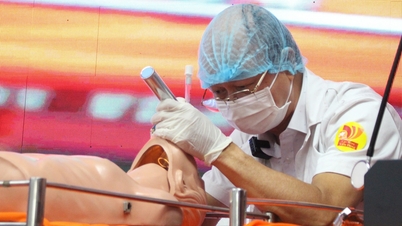



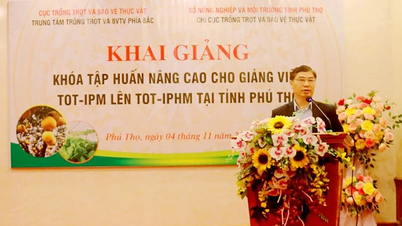

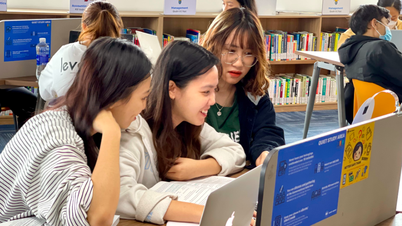
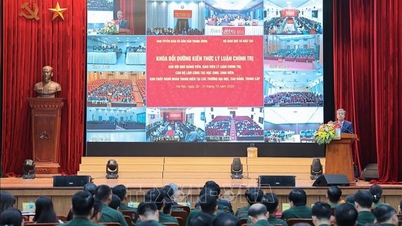








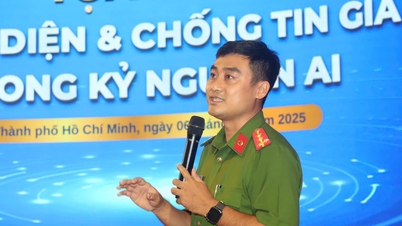













![[Video] Hue Monuments reopen to welcome visitors](https://vphoto.vietnam.vn/thumb/402x226/vietnam/resource/IMAGE/2025/11/05/1762301089171_dung01-05-43-09still013-jpg.webp)


















































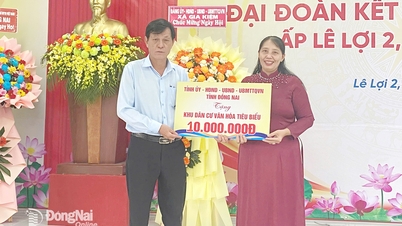


















Comment (0)